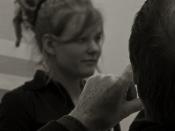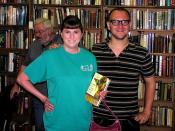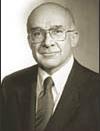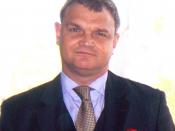The author asserts that we can never know the past directly and hence we truly know only what we experience first-hand. Given that, I agree with the speaker's claim that the historians should interpret the evidence of events collected other people. But I strongly disagree with the speakers author claim that the historians need also to tell stories which unpersuasive as it stands.
The speaker has correctly distinguished the role of the historians from that of mere record-collectors and record-keepers. The record-collectors such as journalists have the primary responsibility of collecting news and information about the recent and past events. And the record-keepers like archivist have the sole responsibility to preserve the records of those events. On the other hand the role of historians extends beyond these. The responsibility of the historians entitles them to interpret the events that occur in the present or the past. In fact the journalists and archivists gather valuable information that acts as sources for the work of the historians.
Thus the role of journalists and archivists involve experiencing the events in the first hand while the historians are not required to have so.
The speaker author's identification of the role of historians as interperter of events has another important merit. The role of historians permit and encourage them to interpret evidence of events. The same evidence can be interpreted differently by different historians. Two historians might disagree on the causes of events, their effects of on subsequent events, and so forth. Different hypotheses by different historians can reveal the inconsistencies of the others and other historians might attempt to reconciliate them which lead to the eventual progress of the field of history.
However, the author has exaggerated the role of the historians by including the responsibility of story telling. Admittedly, the historians need to explicate the mysteries of past and present events and present them to the general people so that they find those both understandable and interesting. But this does not necessarily mean that the historians are permitted to conjure up some fictitious events. In fact those responsibilities are reserved for those novelists, film-maker etc. In fact, the historians role as story tellers might allow them to distort the actual facts and which might jeopardize the true learning of history. History might eventually turn into myths and will it would no longer exist as a branch of knowledge.
In sum, the author has justifiability enunciated the roles and responsibilities of the historians which entitle them to interpret the evidence of events of history. But his assertion unjustifiably extends beyond that by requiring them to assume the role of story tellers which is neither necessary nor healthy for the progress of history.





